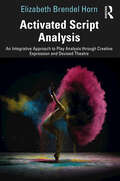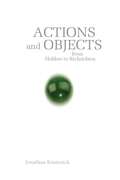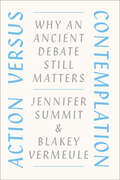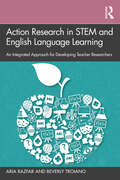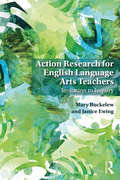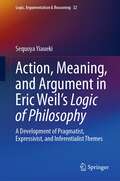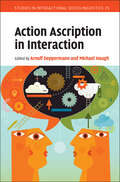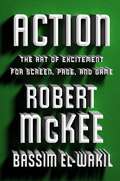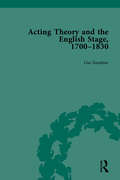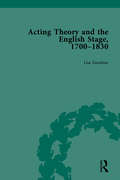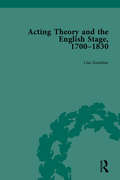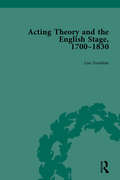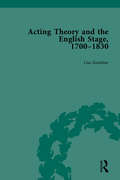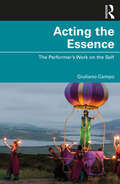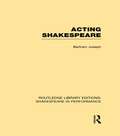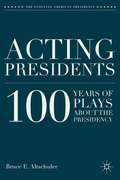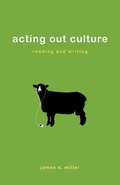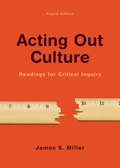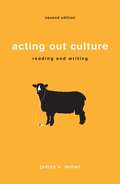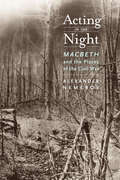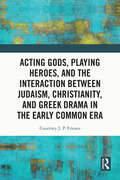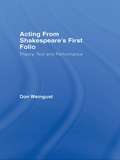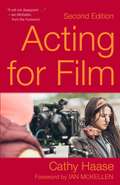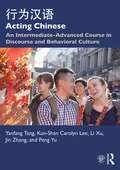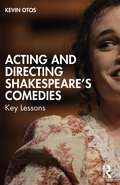- Table View
- List View
Activated Script Analysis: An Integrative Approach to Play Analysis through Creative Expression and Devised Theatre
by Elizabeth Brendel HornActivated Script Analysis engages theatre students in traditional formative script analysis through a fusion of devised theatre and various modes of creative expression, dispelling the notion of script analysis as an isolated pen-to-paper task and reimagining it as a captivating and collaborative process. This book uses diverse, contemporary plays to model the script analysis process for each of four Theatrical Elements: Given Circumstances; Character; Setting; and Structure. By considering each of these elements, readers can uncover patterns and themes within a dramatic text. Woven throughout the study of each theatrical element are "Connections": Personal Connections, which encourage readers to explore a theatrical element within their own lives, as though their lives were a script; Play Connections, which make abstract ideas presented in script analysis concrete through theatre-based play; Professional Connections, which examine how a theatre professional might analyze a script within their own work; and Performative Connections, which provide the opportunity for students to explore a theatrical element through performance using devised theatre strategies. At the end of each chapter, readers are given the opportunity to analyze a text through the lens of a Theatrical Element and to express their findings through a variety of digital, written, visual, and performance-based modes of expression. Activated Script Analysis is designed for undergraduate theatre students and educators, to be used as the primary text in Script Analysis coursework or as a supplemental text in Acting or Directing courses. The book includes access to downloadable templates and example videos, available at www.routledge.com/9781032125398.
Actions and Objects from Hobbes to Richardson
by Jonathan KramnickThis work by Kramnick (English, Rutgers U. ) explores ideas about the relationship between mind and action in Restoration and 18th-century British philosophy and literature. He begins the discussion with an overview of the philosophy of action from Thomas Hobbes to David Hume. Thematic chapters then explore the role of consciousness and mental causation in a world of physical laws; the poetry of the Second Earl of Rochester as concerns questions of consciousness, causation, actions, and personhood; the theory of action of John Locke; the fiction of Eliza Haywood and the connection of mental states to the structure of societies; and Samuel Richardson's Clarissa and the mental causation of actions. Annotation ©2011 Book News, Inc. , Portland, OR (booknews. com)
Action versus Contemplation: Why an Ancient Debate Still Matters
by Jennifer Summit Blakey Vermeule“All of humanity’s problems stem from man’s inability to sit quietly in a room alone,” Blaise Pascal wrote in 1654. But then there’s Walt Whitman, in 1856: “Whoever you are, come forth! Or man or woman come forth! / You must not stay sleeping and dallying there in the house.” It is truly an ancient debate: Is it better to be active or contemplative? To do or to think? To make an impact, or to understand the world more deeply? Aristotle argued for contemplation as the highest state of human flourishing. But it was through action that his student Alexander the Great conquered the known world. Which should we aim at? Centuries later, this argument underlies a surprising number of the questions we face in contemporary life. Should students study the humanities, or train for a job? Should adults work for money or for meaning? And in tumultuous times, should any of us sit on the sidelines, pondering great books, or throw ourselves into protests and petition drives? With Action versus Contemplation, Jennifer Summit and Blakey Vermeule address the question in a refreshingly unexpected way: by refusing to take sides. Rather, they argue for a rethinking of the very opposition. The active and the contemplative can—and should—be vibrantly alive in each of us, fused rather than sundered. Writing in a personable, accessible style, Summit and Vermeule guide readers through the long history of this debate from Plato to Pixar, drawing compelling connections to the questions and problems of today. Rather than playing one against the other, they argue, we can discover how the two can nourish, invigorate, and give meaning to each other, as they have for the many writers, artists, and thinkers, past and present, whose examples give the book its rich, lively texture of interplay and reference. This is not a self-help book. It won’t give you instructions on how to live your life. Instead, it will do something better: it will remind you of the richness of a life that embraces action and contemplation, company and solitude, living in the moment and planning for the future. Which is better? Readers of this book will discover the answer: both.
Action Research in STEM and English Language Learning: An Integrated Approach for Developing Teacher Researchers
by Aria Razfar Beverly TroianoResponding to the linguistic and cultural diversity of the U.S. K–12 student population and an increasing emphasis on STEM, this book offers a model for professional development that engages teachers in transformative action research projects and explicitly links literacy to mathematics and science curriculum through sociocultural principles. Providing detailed and meaningful demonstrations of participatory action research in the classroom, Razfar and Troiano present an effective, systemic approach that helps preservice teachers support students’ funds of knowledge. By featuring teacher and researcher narratives, this book centers teacher expertise and offers a more holistic and humanistic understanding of authentic and empathetic teaching. Focusing on integrating instructional knowledge from ESL, bilingual, and STEM education, the range of cases and examples will allow readers to implement action research projects in their own classrooms. Chapters include discussion questions and additional resources for students, researchers, and educators.
Action Research for English Language Arts Teachers: Invitation to Inquiry
by Mary Buckelew Janice EwingOffering preservice and inservice teachers a guide to navigate the rapidly changing landscape of English Language Arts education, this book provides a fresh perspective on what it means to be a teacher researcher in ELA contexts. Inviting teachers to view inquiry and reflection as intrinsic to their identity and mission, Buckelew and Ewing walk readers through the inquiry process from developing an actionable focus, to data collection and analysis to publication and the exploration of ongoing questions. Providing thoughtful and relevant protocols and models for teacher inquiry, this book establishes a theoretical foundation and offers practical, ready-to-use tools and strategies for engaging in the inquiry process in the context of teachers’ communities. Action Research for English Language Arts Teachers: Invitation to Inquiry includes a variety of examples and scenarios of ELA teachers in diverse contexts, ensuring that this volume is relevant and accessible to all educators.
Action, Meaning, and Argument in Eric Weil's Logic of Philosophy: A Development of Pragmatist, Expressivist, and Inferentialist Themes (Logic, Argumentation & Reasoning #32)
by Sequoya YiauekiThis volume investigates Eric Weil’s innovative conceptualization of the place of violence in the philosophical tradition with a focus on violence’s relationship to language and to discourse. Weil presents violence as the central philosophical problem. According to this reading, the western philosophical tradition commonly conceptualizes violence as an expression of error or as a consequence of the weakness of will. However, by doing so, it misses something essential about the role that violence plays in our conceptual development as well as the place violence holds in our discursive practices.The author draws comparisons between Weil’s work and that of Robert Brandom. Brandom’s inferentialism creates a sophisticated program at the junction of pragmatics and semantics, philosophy of language, logic, and philosophy of mind. The monograph builds on these insights in order to show how an inferentialist reading of Eric Weil is fruitful for both Weilian studies and for inferentialism. This volume will notably be of interest to scholars in philosophy, argumentation theory, and communication studies.
Action Ascription in Interaction (Studies in Interactional Sociolinguistics #35)
by Arnulf Deppermann Michael HaughBringing together a team of global experts, this is the first volume to focus on the ways in which meanings are ascribed to actions in social interaction. It builds on the research traditions of Conversation Analysis and Pragmatics, and highlights the role of interactional, social, linguistic, multimodal, and epistemic factors in the formation and ascription of action-meanings. It shows how inference and intention ascription are displayed and drawn upon by participants in social interaction. Each chapter reveals practices, processes, and uses of action ascription, based on the analysis of audio and video recordings from nine different languages. Action ascription is conceptualised in this volume as not merely a cognitive process, but a social action in its own right that is used for managing interactional concerns and guiding the subsequent course of social interaction. It will be essential reading for academic researchers and advanced students interested in the relationship between language, behaviour and social interaction.
Action: The Art of Excitement for Screen, Page, and Game
by Robert McKee Bassim El-WakilFrom the master of Story, Dialogue, and Character, ACTION offers writers the keys to propulsive storytelling. ACTION explores the ways that a modern-day writer can successfully tell an action story that not only stands apart, but wins the war on clichés. Teaming up with the former co-host of The Story Toolkit, Bassim El-Wakil, legendary story lecturer Robert McKee guides writers to award-winning originality by deconstructing the action genre, illuminating the challenges, and, more importantly, demonstrating how to master the demands of plot with surprising beats of innovation and ingenuity.Topics include: Understanding the Four Core Elements of ActionCreating the Action CastHook, Hold, Pay Off: Design in ActionThe Action MacguffinAction Set PiecesThe Sixteen Action SubgenresA must-add to the McKee storytelling library, ACTION illustrates the principles of narrative drive with precision and clarity by referencing the most popular action movies of our time including: Die Hard, The Star Wars Saga, Dark Knight, The Matrix, and Avengers: Endgame.
Acting Theory and the English Stage, 1700-1830 Volume 5
by Lisa ZunshineDuring the eighteenth century, treatises on the science of elocution, gesture and naturalness abounded. This title draws together a representative selection of the most difficult-to-access texts in the period. It helps cultural historians to examine the place of stagecraft in the eighteenth-century imagination.
Acting Theory and the English Stage, 1700-1830 Volume 4
by Lisa ZunshineDuring the eighteenth century, treatises on the science of elocution, gesture and naturalness abounded. This title draws together a representative selection of the most difficult-to-access texts in the period. It helps cultural historians to examine the place of stagecraft in the eighteenth-century imagination.
Acting Theory and the English Stage, 1700-1830 Volume 3
by Lisa ZunshineDuring the eighteenth century, treatises on the science of elocution, gesture and naturalness abounded. This title draws together a representative selection of the most difficult-to-access texts in the period. It helps cultural historians to examine the place of stagecraft in the eighteenth-century imagination.
Acting Theory and the English Stage, 1700-1830 Volume 2
by Lisa ZunshineDuring the eighteenth century, treatises on the science of elocution, gesture and naturalness abounded. This title draws together a representative selection of the most difficult-to-access texts in the period. It helps cultural historians to examine the place of stagecraft in the eighteenth-century imagination.
Acting Theory and the English Stage, 1700-1830 Volume 1
by Lisa ZunshineDuring the eighteenth century, treatises on the science of elocution, gesture and naturalness abounded. This title draws together a representative selection of the most difficult-to-access texts in the period. It helps cultural historians to examine the place of stagecraft in the eighteenth-century imagination.
Acting the Essence: The Performer's Work on the Self
by Giuliano CampoActing the Essence examines the theory, practice, and history of the art of the performer from the perspective of its inner nature as work on oneself, within, around, and beyond the pedagogy of the actor. Ref lecting primarily on the legacy of Jerzy Grotowski, this book is composed of a series of ref lections on the Stanislavskian lineage of practitioners and related authors, in an attempt to revive awareness of the original path traced by the Russian master and to refine certain ambiguities in contemporary training. In a new media age of image and sound, accompanied by a proliferation of new technologies and means to communicate, emphasised by the COVID-19 crisis, a classic question comes to be asked of us again: What is the essence and the principal objective of the work of the performer? Is performing art still necessary? While proposing a theoretical advancement of the discipline and an historical overview of the relevant practices, this book provides tools for a better understanding of the traditional function of the performer’s practice as work on the self, for its ecological renaissance through a conscient use of trance, attention, and altered states of consciousness. This book offers insight for students in drama, theatre, and performance courses studying acting and performance at university.
Acting Shakespeare (Routledge Library Editions: Shakespeare in Performance)
by Bertram Leon JosephHow did the actors for whom Shakespeare wrote his plays make his characters come to life, how did they convey his words? Can modern directors, actors, and even library readers of Shakespeare learn from them? Creating character and making the Elizabethan playwright’s poetry compelling for the audience is a problem which has seldom been resolved in modern times. This book demonstrates the hard course a modern actor must follow to make real and truthful the words he speaks, and the action and emotion underlying them. With examples and simple exercises, this book helps with the preparation for the great task – providing the actor with a combination that unlocks the Bard's English. Starting with how theatrical speech was understood in Renaissance England, it looks at figures of speech, the powers of persuasion, and the passion and rhythm inherent in the language.
Acting Presidents
by Bruce E. AltschulerThis book seeks to fill a major gap in the literature about fictional representations of presidents by studying more than 40 plays, written since 1900, which have had prominent productions on or off-Broadway or in another major city.
Acting Out Culture: Reading and Writing
by James S. Miller"Acting Out Culture" is the first thematic composition reader to focus students' attention beyond what rules and norms govern their everyday behavior to "how" the rules themselves have been shaped over time.
Acting Out Culture
by James S. MillerCultural messages bombard students daily, laden with unstated rules about what makes our work valuable, our bodies ideal, our connections meaningful. Acting Out Culture empowers students to critically read those messages and use writing to speak back to their culture and question its rules. This book appeals especially to those students who are not full participants in the dominant culture, as well as to their instructors, who want to help students see how subtle (and not so subtle) cultural forces can shape their lives--and how they can challenge and resist those forces. The new edition of Acting Out Culture builds on that success, with provocative readings (more than 50 percent of them new) that challenge the rules we live by; pedagogical tools to encourage students to read, think, and write critically about their culture; and instructional support featuring sample syllabi, additional discussion topics, and ideas for teaching with visuals and online content.
Acting Out Culture: Reading and Writing (Second Edition)
by James S. MillerStudents are bombarded every day with media messages laden with rules: what makes our work valuable, our bodies ideal, our communities picture perfect. Acting Out Culture empowers students to use writing to speak back to their culture and question its rules. Featuring fresh readings by writers who lay bare and challenge the rules we live by, the second edition of Acting Out Culture gives students the tools they need to analyze and write critically about assumptions at the heart of cultural norms.
Acting in the Night
by Alexander NemerovWhat can the performance of a single play on one specific night tell us about the world this event inhabited so briefly? Alexander Nemerov takes a performance of Macbeth in Washington, DC on October 17, 1863--with Abraham Lincoln in attendance--to explore this question and illuminate American art, politics, technology, and life as it was being lived. Nemerov's inspiration is Wallace Stevens and his poem "Anecdote of the Jar," in which a single object organizes the wilderness around it in the consciousness of the poet. For Nemerov, that evening's performance of Macbeth reached across the tragedy of civil war to acknowledge the horrors and emptiness of a world it tried and ultimately failed to change.
Acting Gods, Playing Heroes, and the Interaction between Judaism, Christianity, and Greek Drama in the Early Common Era
by Courtney J. FriesenWhile many ancient Jewish and Christian leaders voiced opposition to Greek and Roman theater, this volume demonstrates that by the time the public performance of classical drama ceased at the end of antiquity the ideals of Jews and Christians had already been shaped by it in profound and lasting ways. Readers are invited to explore how gods and heroes famous from Greek drama animated the imaginations of ancient individuals and communities as they articulated and reinvented their religious visions for a new era. In this study, Friesen demonstrates that Greek theater’s influence is evident within Jewish and Christian intellectual formulations, narrative constructions, and practices of ritual and liturgy. Through a series of interrelated case studies, the book examines how particular plays, through texts and performances, scenes, images, and heroic personae, retained appeal for Jewish and Christian communities across antiquity. The volume takes an interdisciplinary approach involving classical, Jewish, and Christian studies, and brings together these separate avenues of scholarship to produce fresh insights and a reevaluation of theatrical drama in relation to ancient Judaism and Christianity. Acting Gods, Playing Heroes, and the Interaction between Judaism, Christianity, and Greek Drama in the Early Common Era allows students and scholars of the diverse and evolving religious landscapes of antiquity to gain fresh perspectives on the interplay between the gods and heroes—both human and divine—of Greeks and Romans, Jews and Christians as they were staged in drama and depicted in literature.
Acting from Shakespeare's First Folio: Theory, Text and Performance
by Don WeingustActing from Shakespeare's First Folio examines a series of techniques for reading and performing Shakespeare's plays that are based on the texts of the first ‘complete’ volume of Shakespeare's works: the First Folio of 1623. Do extra syllables in a line suggest how it might be played? Can Folio commas reveal character? Don Weingust places this work on Folio performance possibility within current understandings about Shakespearean text, describing ways in which these challenging theories about acting often align quite nicely with the work of the theories' critics. As part of this study, Weingust looks at the work of Patrick Tucker and his London-based Original Shakespeare Company, who have sought to discover the opportunities in using First Folio texts, acting techniques, and what they consider to be original Shakespearean performance methodologies. Weingust argues that their experimental performances at the Globe on Bankside have revealed enhanced possibilities not only for performing Shakespeare, but for theatrical practice in general.
Acting for Film (Second Edition)
by Cathy Haase Ian McKellen"It will not disappoint . . ." —Ian McKellen, from the ForewordAn Authoritative Training Manual for Film Actors and Teachers “In today's entertainment industry of buff bodies and beautiful faces, it's easy to think that a couple of sit-ups and high cheek bones can create a movie legend,” writes film veteran Cathy Haase. However, she adds, what the actor really must have are “technique, craft, and a depth of self-knowledge.” In Acting for Film, Second Edition, Haase shows actors how to develop all of these, sharing her secrets (developed through years of on-camera work) for creating characters who come alive and who touch the souls of the audience. Readers will learn how to apply theatrical training to film acting and hone a personal approach to rendering a character. Acting for Film, Second Edition, is an essential guide for aspiring performers, acting teachers, and anyone interested in gaining a greater understanding of the craft. This new edition includes: Advice on dealing with new technology including CGI and motion capture Concentration and relaxation exercises that will enhance facial expressiveness Exploration of sense memory techniques for on-camera work Animal exercises and their usages Tips for maintaining proper eye focus in front of the camera and conveying the “beats” of a scene, even in the shortest takes For any performer who intends to make a living in front of the camera, Acting for Film, Second Edition, is the most authoritative resource! With Haase’s experience and advice in their pocket, readers will be prepared to land the film role they’ve been dreaming of.
Acting Chinese: An Intermediate-Advanced Course in Discourse and Behavioral Culture 行为汉语
by Yanfang Tang Kunshan Carolyn Lee Li Xu Jin Zhang Peng YuActing Chinese is a year-long course that, together with the companion website, integrates language learning with the acquisition of cultural knowledge, and treats culture as an integral part of human behavior and communication. Using modern day examples of Chinese discourse and behavioral culture, it trains students to perform in culturally appropriate fashion, whilst developing a systematic awareness and knowledge about Chinese philosophy, values and belief systems that will prepare them for further advanced study of Chinese language and culture. Each lesson contains simulated real-life communication scenarios that aim to provide a concrete opportunity to see how native speakers generally communicate or behave in social situations. An essential guide for intermediate to advanced level second language learners, Acting Chinese provides a unique and modern approach to the acquisition of both cultural knowledge and language proficiency.
Acting and Directing Shakespeare's Comedies: Key Lessons
by Kevin OtosActing and Directing Shakespeare’s Comedies: Key Lessons outlines a clear, effective process for acting Shakespeare’s comedies. This book lays out core principles and useful exercises that help the reader better understand, expereince, and implement Shakespeare's comedic design. Building off of modern acting methods as well as contemporary Clown, classical Commedia, and verse-speaking techniques, the author guides the reader toward interpretive and performance choices that are original, justified, and entertaining. Included are clear examples and detailed case studies that illuminate and reenforce these key lessons. This accessible book is for actors, directors, students of Shakespeare, and those who want a fuller, richer awareness of the possibilities within Shakespeare’s comedies and a clear, pragmatic process for creating those performances.
